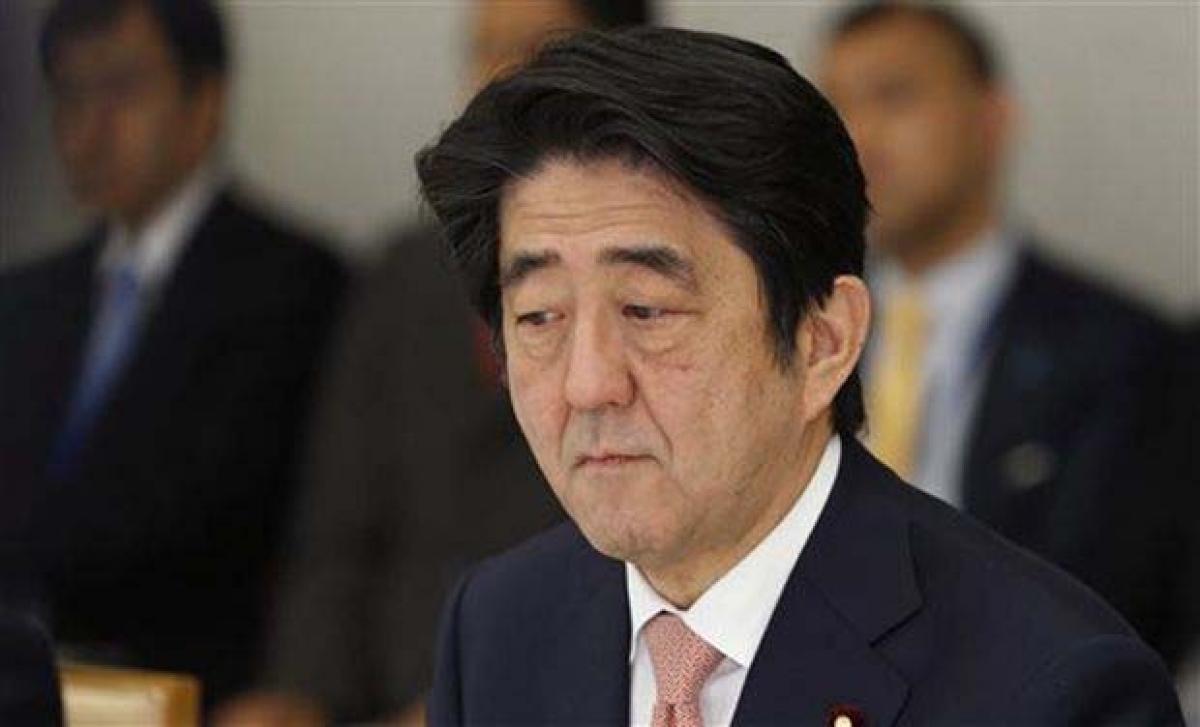Live
- Historic Temple In Sambhal Reopens After 46-Year Closure Following 1978 Riots
- Officials directed to work for deeper reach of guarantees
- Delay In 'One Nation, One Election' Bills Introduction Announced
- Exhilarating ‘Benchmark’ of Venkat Changavalli
- Development activities worth `30 cr launched in Puthalapattu constituency
- Allegations against KTR baseless: BRS leader
- Megastar Chiranjeevi to Visit Allu Arjun’s Residence at 12 PM Today
- Nilima Rane: Trailblazer in Nursing
- Casual yet stylish office outfits for all-day comfort
- TTD to suspend all special darshans from January 10 to 19 amid Vaikuntha dwara darshans
Just In

x
Highlights
Japanese Prime Minister Shinzo Abe will not visit China next week, the government said on Monday, as Beijing prepares for a huge military parade to mark the 70th anniversary of Tokyo\'s defeat in World War II.
Japanese Prime Minister Shinzo Abe will not visit China next week, the government said on Monday, as Beijing prepares for a huge military parade to mark the 70th anniversary of Tokyo's defeat in World War II.
.jpg)
Abe had decided to put off a visit "given the situation in parliament", said top government spokesman Yoshihide Suga. The prime minister faces a parliamentary backlash over his efforts to expand the role of the country's military.
But local media said Japan's government was concerned about the anti-Japanese nature of the planned massive parade through central Beijing and other events to commemorate Tokyo's World War II surrender.
Abe had previously expressed a desire to meet Chinese President Xi Jinping in early September, but the talks had not been confirmed.
"We hope to work to further develop the relationship between the two nations by creating opportunities for the leaders to have talks at international conferences and other events," Suga told reporters.
The announcement confirms that Abe will stay away from the September 3 commemorations in China to mark the end of what Beijing calls the "Chinese People's War of Resistance against Japanese Aggression and the World Anti-Fascist War".
Japan occupied parts of China from the 1930s until the end of World War II and Beijing says millions died as imperial Japanese troops stormed across Asia.
Xi attended a similar parade in Moscow in May commemorating victory over Nazi Germany. Russian President Vladimir Putin is due to return the gesture by travelling to the Beijing event.
Putin is by far the most prominent world leader committed to attend, with leaders of most Western and Western-allied countries, including the United States, staying away amid concerns over Beijing's increasingly assertive actions in the region.
South Korean officials said last week that President Park Geun-Hye would attend the commemorations, but no final decision had been made on whether she will attend the showpiece parade itself.
In Tokyo, Abe and his allies are facing a backlash over deeply unpopular security bills that could pave the way for Japanese troops to see combat in defence of allies for the first time since the war.
Efforts by the nationalist Abe to expand the role of pacifist Japan's Self-Defence Forces have angered China, while simmering territorial disputes between Tokyo and Beijing have also hurt relations.
Abe's recent war anniversary speech upset neighbours China and South Korea, which branded it a non-apology for Tokyo's wartime record.
During the closely watched speech, Abe expressed regret but also said future generations need not apologise for Japan's wartime conduct.
Abe had decided to put off a visit "given the situation in parliament", said top government spokesman Yoshihide Suga. The prime minister faces a parliamentary backlash over his efforts to expand the role of the country's military.
But local media said Japan's government was concerned about the anti-Japanese nature of the planned massive parade through central Beijing and other events to commemorate Tokyo's World War II surrender.
Abe had previously expressed a desire to meet Chinese President Xi Jinping in early September, but the talks had not been confirmed.
"We hope to work to further develop the relationship between the two nations by creating opportunities for the leaders to have talks at international conferences and other events," Suga told reporters.
The announcement confirms that Abe will stay away from the September 3 commemorations in China to mark the end of what Beijing calls the "Chinese People's War of Resistance against Japanese Aggression and the World Anti-Fascist War".
Japan occupied parts of China from the 1930s until the end of World War II and Beijing says millions died as imperial Japanese troops stormed across Asia.
Xi attended a similar parade in Moscow in May commemorating victory over Nazi Germany. Russian President Vladimir Putin is due to return the gesture by travelling to the Beijing event.
Putin is by far the most prominent world leader committed to attend, with leaders of most Western and Western-allied countries, including the United States, staying away amid concerns over Beijing's increasingly assertive actions in the region.
South Korean officials said last week that President Park Geun-Hye would attend the commemorations, but no final decision had been made on whether she will attend the showpiece parade itself.
In Tokyo, Abe and his allies are facing a backlash over deeply unpopular security bills that could pave the way for Japanese troops to see combat in defence of allies for the first time since the war.
Efforts by the nationalist Abe to expand the role of pacifist Japan's Self-Defence Forces have angered China, while simmering territorial disputes between Tokyo and Beijing have also hurt relations.
Abe's recent war anniversary speech upset neighbours China and South Korea, which branded it a non-apology for Tokyo's wartime record.
During the closely watched speech, Abe expressed regret but also said future generations need not apologise for Japan's wartime conduct.

Next Story
More Stories
ADVERTISEMENT
© 2024 Hyderabad Media House Limited/The Hans India. All rights reserved. Powered by hocalwire.com







